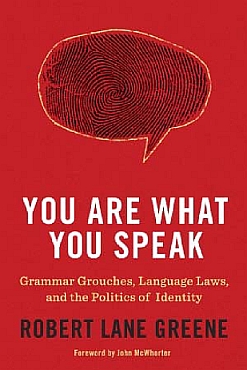In a new book,
You Are What You Speak: Grammar Grouches, Language Laws, and the Politics of Identity (Delacorte Press, 312 pages), Robert Lane Greene, a New York-based journalist and language blogger for
The Economist magazine, makes a knowledgeable discussion of the politics of language in various countries and of the folly of trying to regulate language in a major way. He gives vent to his abhorrence of linguistic meddling by people who complain that English is on a precipitate decline and who insist on imposing specious rules on the language ostensibly to save it from ruin.

“The fact is that scolds have been bewailing others’ vocabulary, pronunciation, and grammar virtually since English was written down,” Greene says in the book. “The first printer in English, William Caxton, complained about English’s diversity and change in a story … By the Elizabethan period a century later, a ‘standard’ English based on the London dialect was being built, though other dialects persisted around England. At the same time, poets and playwrights played with still-fluid conventions. Shakespeare violated virtually every rule that would later become a prescriptive shibboleth, gleefully splitting infinitives, using ‘they’ with a singular antecedent, verbing nouns, ending sentences with prepositions, and so forth.”
But over the centuries, Greene points out, although so many invented rules for English usage managed to make their way into our lives, all the prescriptivist grousing to keep English follow these rules has utterly failed to stop language change.
In “Our False Beliefs About Language,” a review of Greene’s
You Are What You Speak that came out in the April 3, 2011 issue of
The New York Times Book Review, Geoffrey Nunberg observes that Greene has some grounds for his claim that modern sticklerism is driven by “an aggrieved conservatism, standing against youth, minorities and change.” With linguistic opinion so polarized these days, Nunberg says, indeed “ it’s hard to find fault with a usage without evoking the sticklers and scolds that Greene incisively skewers. But the problem isn’t that we persist in making judgments about language. It’s that we’ve gotten so bad at it.”
Read an excerpt from Robert Lane Greene’s You Are What You Speak now! Read Geoffrey Nunberg’s review of Robert Lane Greene’s You Are What You Speak in The New York Times Book Review now!ABOUT THE AUTHOR:Robert Lane Greene, a journalist based in New York, is a correspondent for
The Economist and writes for the magazine’s language blog. His writing has also appeared in
The New York Times,
Slate, the
New Republic, and the
Daily Beast. A frequent television and radio commentator, Greene is an adviser to Freedom House, an adjunct assistant professor in the Center for Global Affairs at New York University, and a term member of the Council on Foreign Relations. He graduated with honors from Tulane University in 1997, receiving a B.A. in International Relations and History. He later won a Marshall Scholarship and completed an M.Phil. in European Politics and Society at the University of Oxford in 1999. He is fluent in German, Spanish, French and Portuguese, and conversant in Russian, Arabic, Danish, and Italian.
RELATED READINGS:Just off the press is
Green’s Dictionary of Slang (Oxford University, 6,000 pages), the three-volume work of Jonathon Green, a leading slang lexicographer in the United Kingdom. The collection, which totals 10.3 million words and over 53,000 entries, covers slang from the past five centuries right up to the present day, from all the different English-speaking countries and regions. Says Ben Zimmer in his review of the book in
The New York Times Sunday Book Review for April 3, 2011: “(Greene’s) monument to the inventiveness of speakers from Auckland to Oakland takes its place as the pièce de résistance of English slang studies. To put it plain, it’s copacetic.”*
------------
*The adjective “copacetic” means “very satisfactory.”Read Ben Zimmer’s “The Definitive Slang Dictionary” in The New York Times Sunday Book Review now! In her book
Use and Abuse of Literature ((Pantheon; 320 pages), Harvard professor Marjorie Garber reflects on the history of literary writing, literary criticism and the social value of both. In a classroom anecdote about teaching her most beloved author, Garber observes: “Since Shakespeare wrote so many years ago, scholars had had all this time to get it right, hadn’t they? What was the problem, and why couldn’t the professor give the right answer right away, instead of beating around the bush?"
Read Seth Lehrer’s review of Marjorie Gerber’s Use and Abuse of Literature in the San Francisco Chronicle now!